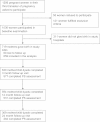Mental health related determinants of parenting stress among urban mothers of young children--results from a birth-cohort study in Ghana and Côte d'Ivoire
- PMID: 24884986
- PMCID: PMC4048600
- DOI: 10.1186/1471-244X-14-156
Mental health related determinants of parenting stress among urban mothers of young children--results from a birth-cohort study in Ghana and Côte d'Ivoire
Abstract
Background: There are limited data on the parenting stress (PS) levels in sub-Saharan African mothers and on the association between ante- and postnatal depression and anxiety on PS.
Methods: A longitudinal birth cohort of 577 women from Ghana and Côte d'Ivoire was followed from the 3rd trimester in pregnancy to 2 years postpartum between 2010 and 2013. Depression and anxiety were assessed by the Patient Health Questionnaire depression module (PHQ-9) and the Generalized Anxiety Disorder (GAD-7) at baseline, 3 month, 12 month and 24 month postpartum. PS was measured using the Parenting Stress Index-Short Form (PSI-SF) at 3, 12 and 24 month. The mean total PS score and the subscale scores were compared among depressed vs. non-depressed and among anxious vs. non-anxious mothers at 3, 12 and 24 month postpartum. The proportions of clinical PS (PSI-SF raw score > 90) in depressed vs. non-depressed and anxious vs. non-anxious mothers were also compared. A generalized estimating equation (GEE) approach was used to estimate population-averaged associations between women's depression/anxiety and PS adjusting for age, child sex, women's anemia, education, occupation, spouse's education, and number of sick child visits.
Results: A total of 577, 531 and 264 women completed the PS assessment at 3 month, 12 month and 24 month postpartum across the two sites and the prevalences of clinical PS at each time point was 33.1%, 24.4% and 14.9% in Ghana and 30.2%, 33.5% and 22.6% in Côte d'Ivoire, respectively. At all three time points, the PS scores were significantly higher among depressed mothers vs. non-depressed mothers. In the multivariate regression analyses, antepartum and postpartum depression were consistently associated with PS after adjusting for other variables.
Conclusions: Parenting stress is frequent and levels are high compared with previous studies from high-income countries. Antepartum and postpartum depression were both associated with PS, while antepartum and postpartum anxiety were not after adjusting for confounders. More quantitative and qualitative data are needed in sub-Saharan African populations to assess the burden of PS and understand associated mechanisms. Should our findings be replicated, it appears prudent to design and subsequently evaluate intervention strategies.
Similar articles
-
Longitudinal course of ante- and postpartum generalized anxiety symptoms and associated factors in West-African women from Ghana and Côte d'Ivoire.J Affect Disord. 2016 Jun;197:125-33. doi: 10.1016/j.jad.2016.03.014. Epub 2016 Mar 9. J Affect Disord. 2016. PMID: 26991367
-
Association of antepartum and postpartum depression in Ghanaian and Ivorian women with febrile illness in their offspring: a prospective birth cohort study.Am J Epidemiol. 2013 Nov 1;178(9):1394-402. doi: 10.1093/aje/kwt142. Epub 2013 Sep 7. Am J Epidemiol. 2013. PMID: 24013202
-
Antepartum depression and anxiety associated with disability in African women: cross-sectional results from the CDS study in Ghana and Côte d'Ivoire.PLoS One. 2012;7(10):e48396. doi: 10.1371/journal.pone.0048396. Epub 2012 Oct 26. PLoS One. 2012. PMID: 23110236 Free PMC article.
-
Estimates of serious fungal infection burden in Côte d'Ivoire and country health profile.J Mycol Med. 2021 Mar;31(1):101086. doi: 10.1016/j.mycmed.2020.101086. Epub 2020 Nov 21. J Mycol Med. 2021. PMID: 33259981 Review.
-
It Is Time for Routine Screening for Perinatal Mood and Anxiety Disorders in Obstetrics and Gynecology Settings.Obstet Gynecol Surv. 2017 Sep;72(9):553-568. doi: 10.1097/OGX.0000000000000477. Obstet Gynecol Surv. 2017. PMID: 28905985 Review.
Cited by
-
Parent, child, and situational factors associated with parenting stress: a systematic review.Eur Child Adolesc Psychiatry. 2024 Jun;33(6):1687-1705. doi: 10.1007/s00787-022-02027-1. Epub 2022 Jul 25. Eur Child Adolesc Psychiatry. 2024. PMID: 35876894 Free PMC article.
-
Prevalence, associated factors and perinatal outcomes of antepartum depression in Ibadan Nigeria.BMC Pregnancy Childbirth. 2022 Mar 18;22(1):219. doi: 10.1186/s12884-022-04549-7. BMC Pregnancy Childbirth. 2022. PMID: 35303804 Free PMC article.
-
Postnatal Depression Beyond 12 Months: A Systematic Review and Meta-Analysis.Int J Ment Health Nurs. 2025 Apr;34(2):e70018. doi: 10.1111/inm.70018. Int J Ment Health Nurs. 2025. PMID: 40055815 Free PMC article.
-
Parental Stress in Raising a Child with Developmental Disabilities in a Rural Community in South Africa.Int J Environ Res Public Health. 2023 Feb 23;20(5):3969. doi: 10.3390/ijerph20053969. Int J Environ Res Public Health. 2023. PMID: 36900985 Free PMC article.
-
Epidemiology of maternal depression, risk factors, and child outcomes in low-income and middle-income countries.Lancet Psychiatry. 2016 Oct;3(10):973-982. doi: 10.1016/S2215-0366(16)30284-X. Epub 2016 Sep 17. Lancet Psychiatry. 2016. PMID: 27650773 Free PMC article. Review.
References
-
- Abidin RR. Parenting Stress Index: Professional Manual. 3. Odessa, FL: Psychological Assessment Resources, Inc; 1995.
Publication types
MeSH terms
LinkOut - more resources
Full Text Sources
Other Literature Sources
Medical


